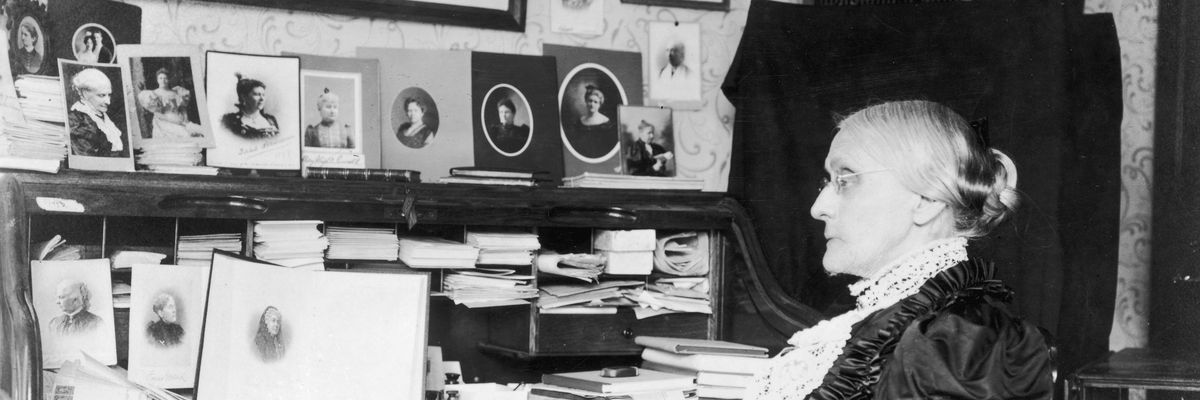In honor of MLK's long arc of the moral universe bending toward justice, GOP threats to block it, and many women's righteous fight to save the Republic from them, we mark both a hard-won Juneteenth and the now-unthinkable day in 1873 when fierce suffragist Susan B. Anthony was found guilty by a bunch of men for the nefarious crime of voting "as a person of the female sex." She called the verdict "the greatest outrage history ever witnessed," though there's historically, admittedly some tough competition in the outrage department. Anthony's trial came after she had the singular joy of dropping her scandalous vote into a ballot box in her hometown of Rochester, New York in the 1872 presidential election after decades of insisting, on behalf of all disenfranchised women, "To vote is our wish and will." In speeches, petitions and her newspaper The Revolution, she worked to "educate all women to do precisely as I have done - rebel against your man-made, unjust, unconstitutional forms of law that tax, fine, imprison and hang women while they deny them the right of representation in the government." A few days before she voted, she and her three sisters, part of a group of 50 fiery women, had gone to a registration office set up in a barbershop and, as one bewildered official later testified, "demanded that we register them as voters," which, after an hour's debate, they did. At the ballot box, officials were likewise flummoxed by "a question in which some of the best minds of the country are divided." "Well I have been & gone & done it!!," Anthony later rejoiced to her friend and comrade Elizabeth Cady Stanton. "So we are in for a fine agitation."
In January a grand jury of 20 men indicted her, thus giving her, until her May trial, a splendid soapbox for a wide-ranging lecture tour asking, "Is it a Crime for a Citizen of the United States to Vote?" In town after town, she quoted the Declaration of Independence, the Constitution, James Madison, Thomas Paine and the new 14th Amendment to defend the "privileges and immunities" of citizenship, including voting. At her "mere farce" of a trial, in a new bonnet of blue silk, she described Justice Ward Hunt as "a small-brained, pale-faced, prim-looking man"; he refused to let her speak and read out a guilty verdict he'd written before the trial. At her sentencing, he made the grave error of asking if she wanted to say anything. "Yes, your honor, I have many things to say," she retorted. "You have trampled underfoot every vital principle of our government. My natural rights, civil rights, political rights, judicial rights are all alike ignored...I am degraded from the status of a citizen to that of a subject" under "this so-called form of government." He kept trying to shut her up - "The court cannot allow the prisoner to go on" - and she kept excoriating him. Having been silenced by those of whom "not one is my peer," she said, "Your honor will not deny me this one and only poor privilege of protest against this high-handed outrage." It would take until 1906, 14 years after her death, for women to get the vote, and the ignorance behind her struggle persisted even unto last year, when some orange idiot tried to "pardon" her. Still, noted one news report, her trial made its triumphant point: "She has voted, and the American Constitution has survived the shock." In the end, Anthony was fined $100. She told the judge "I shall never pay a dollar of your unjust penalty," and she didn't.

